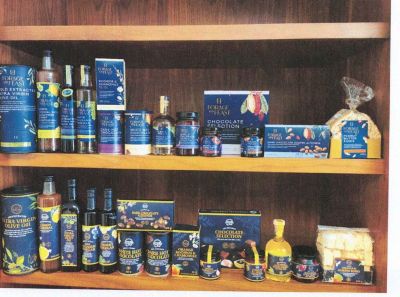- within International Law, Law Department Performance and Cannabis & Hemp topic(s)
The posh-nosh spat has been much in the news. I refer, of course, to the judgment in the case of Shoprite Checkers (Pty) Ltd v Pick 'n Pay Retailers (Pty) Ltd, handed down by Judge Goliath in the Western Cape High Court on 17 November 2023.

The FORAGE AND FEAST range
In November 2020, Shoprite Checkers launched its FORAGE AND FEAST range of foodstuffs, a premium range of products that we're told is 'usually associated with speciality delis'. The trade mark FORAGE AND FEAST appears toward the top of the front-facing packaging in a gold font and features the colour combination of navy blue and gold. The FORAGE AND FEAST range has seemingly been a great success - sales have been good through considerable promotion, and the range is endorsed by a Michelin star chef, Jan Hendrik van der Westhuizen.
The CRAFTED COLLECTION range
In 2021, retail rival Pick 'n Pay launched a new premium range of foodstuffs for its 'core upper customer', describing it as a new 'foodie brand'. This range was branded CRAFTED COLLECTION, which appears toward the top of the front facing packaging and features the colour combination of navy blue and gold.
A claim of passing-off
Shoprite Checkers then sued, claiming that Pick 'n Pay was, passing-off its products as those of Shoprite Checkers, through the use of a similar packaging get-up. Pick 'n Pay contested the claim, arguing that Shoprite Checkers had failed to establish a protectable reputation in the packaging get-up and that the blue and gold colour combination is common. Pick 'n Pay claimed that there was no proof of consumer confusion in the marketplace.
The law of passing-off
Judge Goliath then did what judges faced with a passing-off claim tend to do, she looked at the considerable body of South African case law that exists in this field and summarised the passing-off as follows:
What is passing-off?
This often-quoted definition comes from the famous Capital Estate case:
'The wrong known as passing off consists in a representation by one person that his business (or merchandise as the case may be) is that of another, or that it is associated with that of another, and in order to determine whether a representation amounts to passing off, one enquires whether there is a reasonable likelihood that members of the public may be confused into believing that the business of the one is, or is connected with, that of another.'
The minimum requirements for a passing-off claim
Some cases say that you need to establish a reputation and deception. Others talk of the three pillars of a passing-off claim, namely proof of reputation, misrepresentation and damages.
The evidence that is required is
...evidence of extensive use and advertising.
A reputation can be inferred
...from evidence of sales and advertising expenditure.
The Plascon-Evans case
The famous Plascon-Evans passing-off case tells us that a court must consider the following:
- The similarities and differences in the get-ups.
- The likely impact of the respondent's trade mark on an average consumer, with average intelligence, eyesight and caution, taking account of the trade mark's sense, sound and appearance.
- How the get-ups are likely to be encountered in the market.
- The concepts of imperfect recollection, dominant features and the general impression created by the trade marks.
- The fact that the goods will not necessarily be seen side-by-side.
Applying the law to the facts
Judge Goliath made the following findings:
There was a reputation
The judge said that 'the Forest and Feast get-up had developed into a distinguishable and reputable brand ...comprising of substantial goodwill... and a large loyal and devoted group of customers.'
The goods
The judge also said that the products involved in this case were identical or comparable, with both operating in the same premium or luxury consumable market.
The get-ups
The judge said that 'a cursory look at the respective products reveals that the visual similarities between the get-ups are remarkable'.
Confusion
The judge further stated that she was 'satisfied that the Crafted Collection range, viewed holistically, is almost certain to confuse and deceive the public, and potentially result in damages to the applicant.'
She also said that 'the respondent's behaviour...is likely to detrimentally affect the applicant's reputation and goodwill.'
The end result
As passing-off had been established, an interdict was granted, together with delivery-up or destruction of goods, an enquiry into damages, and legal costs.
Reaction
Pick 'n Pay said that it was disappointed with the ruling, adding that it would seek leave to appeal the judgment: 'Our intention is never to mislead customers, and we do not believe we have done so. We are proud of our Crafted Collection range, which offers customers great quality, value and innovation.'
Reviewed by Gaelyn Scott, Head of ENS' IP Practice.
The content of this article is intended to provide a general guide to the subject matter. Specialist advice should be sought about your specific circumstances.


